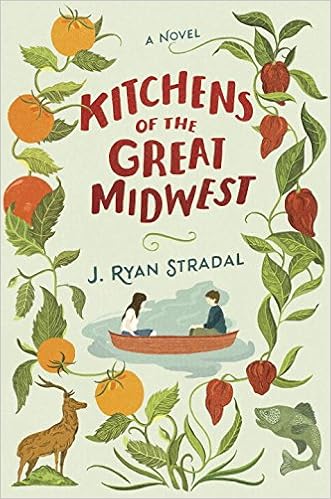 |
| Pamela Dorman Books |
J. Ryan Stradal
2015
The Summary
"Kitchens of the Great Midwest, about a young woman with a once-in-a-generation palate who becomes the iconic chef behind the country's most coveted dinner reservation, is the summer's most hotly-anticipated debut and already a New York Times bestseller.
"When Lars Thorvald's wife, Cynthia, falls in love with wine--and a dashing sommelier--he's left to raise their baby, Eva, on his own. He's determined to pass on his love of food to his daughter--starting with pureed pork shoulder. As Eva grows, she finds her solace and salvation in the flavors of her native Minnesota. From Scandinavian lutefisk to hydroponic chocolate habaneros, each ingredient represents one part of Eva's journey as she becomes the star chef behind a legendary and secretive pop-up supper club, culminating in an opulent and emotional feast that's a testament to her spirit and resilience.
"Each chapter in J. Ryan Stradal's startlingly original debut tells the story of a single dish and character, at once capturing the zeitgeist of the Midwest, the rise of foodie culture, and delving into the ways food creates community and a sense of identity. By turns quirky, hilarious, and vividly sensory, Kitchens of the Great Midwest is an unexpected mother-daughter story about the bittersweet nature of life--its missed opportunities and its joyful surprises. It marks the entry of a brilliant new talent."
The Good
I was surprisingly enchanted by J. Ryan Stradal's Kitchens of the Great Midwest. Although it ultimately revolves around Eva Thorvald, it delves into the lives of the people who have helped shape her life--her cousin Brock, her close friend Pat Praeger, her worst enemy Olivia, and her biological father, Lars. It weaves together their lives, introducing the stories of many characters and developing their individual history, as well as their intertwined lives.
It's truly fascinating to see the connections between them. I especially liked that each chapter was named for the dish that influenced Eva's life the most. Each chapter reflects a specific period in her life: the lutefisk her father used to make, the chocolate habanero peppers she grew in her closet, the sweet pepper jelly her cousin loved to eat, the golden bantam corn she used in one of her dishes when she cooked for friends--and each piece fits into the puzzle so meticulously as to reveal her entire life.
I loved the interconnected feeling of Kitchens of the Great Midwest, like a web that holds Eva and all the other characters together, like separate dishes that come together to form an excellent dinner. All these ingredients come together to form an exquisite and intricate novel with wonderful characters, excellent storytelling, and fantastic narrators.
And, speaking of narrators, I loved listening to Kitchens of the Great Midwest as an audiobook. Amy Ryan and Michael Stuhlbarg make excellent narrators, bringing the characters of Eva and Lars and Brock and others to life. It brings a little something extra to the novel, gives it a singular flavor that left me craving more even as I reached the final chapter.
Overall, I was incredibly pleased with Stradal's first novel. It was an epic undertaking that mixed together some of the best storytelling and characters to make something positively wonderful.
The Bad
The language is a little strong in some spots (especially Brock's chapters, which are littered with an excess of expletives), and the novel deals with some very mature themes. While I wouldn't exactly recommend it to younger readers, I don't think that should stop anyone else from reading (or listening) and enjoying Kitchens of the Great Midwest.
The Ugly
Life can be an ugly thing: losing loved ones, dealing with complicated family ties and decaying marriages, enduring bullies, trying to find one's place in the world. Eva, despite her many culinary gifts, is not spared these many sorrows--and, as you read, you realize she has a big heart despite the difficulties that conspire against her.
No comments:
Post a Comment